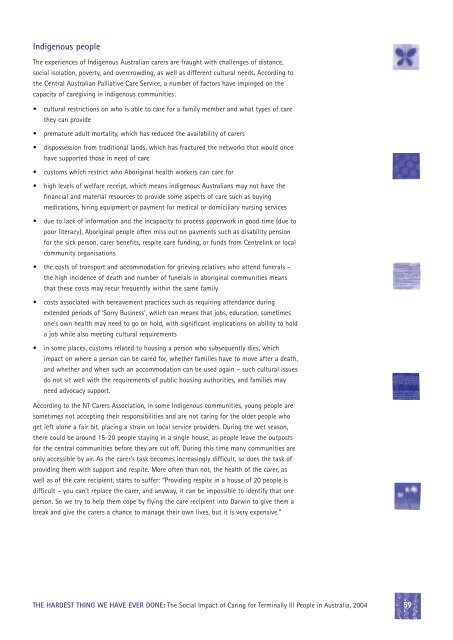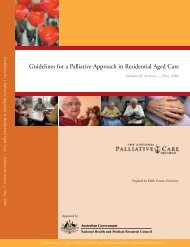The hardest thing we have ever done - Palliative Care Australia
The hardest thing we have ever done - Palliative Care Australia
The hardest thing we have ever done - Palliative Care Australia
You also want an ePaper? Increase the reach of your titles
YUMPU automatically turns print PDFs into web optimized ePapers that Google loves.
Indigenous people<br />
<strong>The</strong> experiences of Indigenous <strong>Australia</strong>n carers are fraught with challenges of distance,<br />
social isolation, poverty, and overcrowding, as <strong>we</strong>ll as different cultural needs. According to<br />
the Central <strong>Australia</strong>n <strong>Palliative</strong> <strong>Care</strong> Service, a number of factors <strong>have</strong> impinged on the<br />
capacity of caregiving in indigenous communities:<br />
• cultural restrictions on who is able to care for a family member and what types of care<br />
they can provide<br />
• premature adult mortality, which has reduced the availability of carers<br />
• dispossession from traditional lands, which has fractured the networks that would once<br />
<strong>have</strong> supported those in need of care<br />
• customs which restrict who Aboriginal health workers can care for<br />
• high levels of <strong>we</strong>lfare receipt, which means indigenous <strong>Australia</strong>ns may not <strong>have</strong> the<br />
financial and material resources to provide some aspects of care such as buying<br />
medications, hiring equipment or payment for medical or domiciliary nursing services<br />
• due to lack of information and the incapacity to process paperwork in good time (due to<br />
poor literacy), Aboriginal people often miss out on payments such as disability pension<br />
for the sick person, carer benefits, respite care funding, or funds from Centrelink or local<br />
community organisations<br />
• the costs of transport and accommodation for grieving relatives who attend funerals –<br />
the high incidence of death and number of funerals in aboriginal communities means<br />
that these costs may recur frequently within the same family<br />
• costs associated with bereavement practices such as requiring attendance during<br />
extended periods of ‘Sorry Business’, which can means that jobs, education, sometimes<br />
one’s own health may need to go on hold, with significant implications on ability to hold<br />
a job while also meeting cultural requirements<br />
• in some places, customs related to housing a person who subsequently dies, which<br />
impact on where a person can be cared for, whether families <strong>have</strong> to move after a death,<br />
and whether and when such an accommodation can be used again – such cultural issues<br />
do not sit <strong>we</strong>ll with the requirements of public housing authorities, and families may<br />
need advocacy support.<br />
According to the NT <strong>Care</strong>rs Association, in some Indigenous communities, young people are<br />
sometimes not accepting their responsibilities and are not caring for the older people who<br />
get left alone a fair bit, placing a strain on local service providers. During the <strong>we</strong>t season,<br />
there could be around 15-20 people staying in a single house, as people leave the outposts<br />
for the central communities before they are cut off. During this time many communities are<br />
only accessible by air. As the carer’s task becomes increasingly difficult, so does the task of<br />
providing them with support and respite. More often than not, the health of the carer, as<br />
<strong>we</strong>ll as of the care recipient, starts to suffer: “Providing respite in a house of 20 people is<br />
difficult – you can’t replace the carer, and anyway, it can be impossible to identify that one<br />
person. So <strong>we</strong> try to help them cope by flying the care recipient into Darwin to give them a<br />
break and give the carers a chance to manage their own lives, but it is very expensive.”<br />
THE HARDEST THING WE HAVE EVER DONE: <strong>The</strong> Social Impact of Caring for Terminally Ill People in <strong>Australia</strong>, 2004<br />
59
















